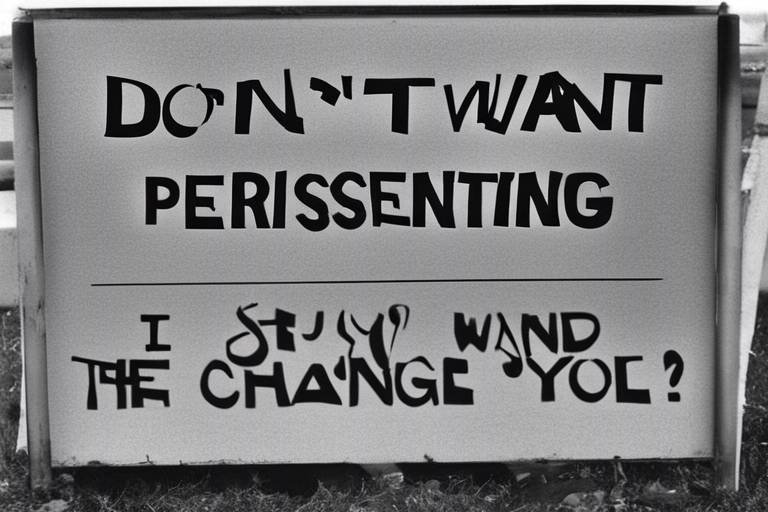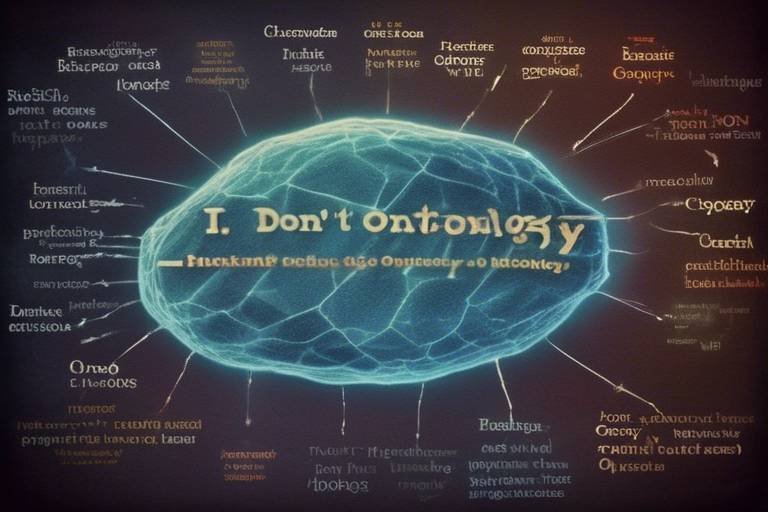Ontology's Influence on General Semantics
Have you ever pondered how the way we think about existence impacts our understanding of language and communication? Well, you're not alone! The intricate relationship between ontology—the philosophical study of being and existence—and general semantics—which delves into how language influences thought—shapes our perceptions in profound ways. When we explore how these two fields intertwine, we uncover a rich tapestry of ideas that not only inform our understanding of reality but also affect how we communicate with one another.
At its core, ontology provides a framework for categorizing our experiences and perceptions. It sets the stage for how we interpret the world around us. For instance, if we view reality as a static entity, our communication might reflect that rigidity, often leading to misunderstandings. On the other hand, if we perceive reality as dynamic and ever-changing, our conversations might become more fluid and adaptable. This interplay between ontology and semantics is not just theoretical; it has practical implications in our daily interactions.
Consider this: when we engage in a conversation, we're not merely exchanging words; we're also sharing our interpretations of those words, which are deeply rooted in our ontological beliefs. This means that two people can hear the same sentence but derive completely different meanings based on their underlying assumptions about existence. Such nuances highlight the importance of understanding how ontology influences our semantic interpretations, making it essential for effective communication.
Furthermore, the implications of this relationship extend beyond personal interactions. In broader societal contexts, differing ontological views can lead to significant misunderstandings and conflicts. For example, debates on topics such as climate change or social justice often hinge on differing perceptions of reality and existence. When stakeholders come from divergent ontological backgrounds, the dialogue becomes not just about the issues at hand but also about the very nature of reality itself. This underscores the need for awareness of how ontology shapes our semantic frameworks.
In summary, the influence of ontology on general semantics is profound and multifaceted. By recognizing this relationship, we can enhance our communication skills, foster better understanding, and navigate the complexities of human interaction with greater awareness. As we dive deeper into this exploration, we will uncover more about how these philosophical frameworks shape our everyday lives and the way we connect with others.
- What is ontology? - Ontology is the branch of philosophy that studies the nature of being, existence, and the categories of being.
- How does general semantics relate to language? - General semantics examines how language and symbols influence thought processes and behavior, focusing on how we derive meaning from our interactions.
- Why is the relationship between ontology and general semantics important? - Understanding this relationship helps clarify how our beliefs about existence influence our interpretations of language and meaning, impacting communication and interpersonal relations.
- Can differing ontological views lead to communication issues? - Yes, differing ontological perspectives can create misunderstandings in communication, as individuals may interpret meanings differently based on their underlying beliefs about reality.

Understanding Ontology
Ontology, in its essence, is the philosophical study of being, existence, and the nature of reality. It dives deep into questions that many of us ponder, such as "What does it mean to exist?" and "What is the nature of objects and their properties?" Think of ontology as the foundation of a house; without a solid base, everything built on top can become unstable. This foundational aspect is crucial because it shapes our conceptual frameworks, guiding how we categorize and interpret information in our lives.
When we engage with ontology, we are not merely discussing abstract concepts; we are exploring the very lenses through which we perceive the world around us. For instance, consider how different cultures may have unique ontological views that influence their understanding of time, space, and existence. This diversity leads to varied interpretations of reality, which in turn affects communication and meaning-making. In this way, ontology is not just a philosophical curiosity; it has real-world implications that ripple through our daily interactions.
Another fascinating aspect of ontology is its role in shaping language and semantics. The way we define and categorize entities in our ontology directly influences how we use language to express those concepts. For example, if one holds a materialist ontology, they might view objects as mere physical entities, whereas an idealist might perceive them as manifestations of ideas or consciousness. This difference in perspective can lead to entirely different interpretations of the same situation or text. Understanding these distinctions is crucial for effective communication, as it allows us to navigate potential misunderstandings that arise from differing ontological assumptions.
Moreover, ontology is deeply intertwined with our cognitive processes. Our mental models, which help us make sense of the world, are often built on ontological beliefs. This means that our understanding of existence influences not just how we communicate, but also how we think, feel, and behave. For instance, if someone believes in a deterministic view of the universe, their interpretation of free will and personal responsibility may be significantly different from someone who subscribes to a more existential perspective. Recognizing these underlying beliefs can enhance our empathy and improve our interactions with others.
As we delve deeper into the realm of ontology, we can see that it is not a static field; it evolves with philosophical discourse and cultural shifts. The questions posed by ontologists are as relevant today as they were centuries ago. In our rapidly changing world, where technology and societal norms are in constant flux, understanding ontology becomes even more critical. It equips us with the tools to question our assumptions, engage in meaningful dialogue, and foster a deeper understanding of the human experience.
In summary, ontology serves as a vital framework for understanding existence and meaning. It influences how we categorize the world, shapes our language, and informs our cognitive processes. By examining our ontological beliefs, we can gain insight into our interactions with others and the world around us. This awareness not only enriches our personal understanding but also enhances our communication and connection with others.

The Basics of General Semantics
General semantics is a fascinating field that dives deep into the intricate ways language and symbols affect our thoughts and behaviors. Imagine for a moment that every word you utter is like a key, unlocking a unique door to understanding, perception, and interaction. This is precisely what general semantics aims to explore. It’s not just about the words themselves but about how those words shape our reality and influence our communication. By examining the principles of general semantics, we can uncover how our ontological assumptions—our beliefs about existence and being—impact the way we interpret meaning in our daily interactions.
At its core, general semantics is about understanding the relationship between language and thought. It posits that the words we use can significantly alter our perceptions and reactions. For instance, consider how the term "freedom" can evoke vastly different emotions and interpretations depending on an individual's background and experiences. This variability illustrates how language is not merely a tool for communication but also a powerful influencer of our thoughts and actions.
One of the foundational ideas of general semantics is the concept of semantic reactions. These reactions refer to how individuals respond to words and symbols based on their personal experiences and cultural contexts. When we hear a word, our brains don’t just process its dictionary definition; they also draw on a rich tapestry of associations that can lead to different interpretations. This is where the interplay between ontology and semantics becomes crucial. Our beliefs about reality shape these associations, ultimately guiding our responses in communication.
Moreover, general semantics emphasizes the importance of context. Just like a painter uses different colors to convey a mood, the context in which language is used can drastically change its meaning. For example, the phrase "I love this" can take on different connotations if said in a casual conversation among friends versus a formal business setting. This highlights the need for awareness of how the context can alter our understanding of meaning, making it essential for effective communication.
To further illustrate the principles of general semantics, consider the following table that outlines some key concepts:
| Concept | Description |
|---|---|
| Semantic Reaction | The response triggered by a word based on personal and cultural experiences. |
| Context | The circumstances surrounding the use of language that influence its meaning. |
| Language as a Tool | Language shapes our reality by influencing our thoughts and perceptions. |
In summary, general semantics provides a lens through which we can better understand the complex relationship between language, thought, and behavior. By recognizing how our ontological beliefs shape our semantic reactions, we can become more mindful communicators, enhancing our interactions in both personal and societal contexts. So, the next time you engage in conversation, remember that the words you choose are not just sounds; they are keys that unlock doors to understanding, connection, and meaning.

Historical Context
To truly grasp the intricate relationship between ontology and general semantics, it's essential to dive into their . Both fields have evolved significantly over time, shaped by the thoughts and writings of key philosophers. This evolution reflects a dynamic interplay between how we perceive existence and the way we communicate about it. For instance, the ancient Greeks laid the groundwork for ontological discussions, with philosophers like Plato and Aristotle pondering the nature of being and reality. Their explorations prompted questions that resonate even today: What does it mean to exist? How do our concepts influence our understanding of the world?
As we moved into the modern era, the Enlightenment brought a surge of interest in empirical observation and rational thought. Thinkers like Immanuel Kant introduced the idea that our understanding of reality is filtered through our perceptions, suggesting a complex relationship between ontology and semantics. Kant's work prompted further inquiry into how our cognitive frameworks shape our interpretation of meaning.
The 20th century saw the emergence of several philosophical movements that further bridged ontology and general semantics. Existentialism, for example, emphasized individual experience and existence, challenging traditional notions of meaning. Philosophers like Jean-Paul Sartre and Martin Heidegger explored how our being-in-the-world influences our language and communication. Their thoughts highlighted the importance of context in understanding meaning, suggesting that our ontological assumptions directly impact our semantics.
Additionally, phenomenology, pioneered by thinkers such as Edmund Husserl, focused on the structures of experience and consciousness. This movement encouraged a deeper examination of how our lived experiences shape our understanding of reality and, consequently, our communication practices. The interplay between these philosophical movements has led to a richer comprehension of how meaning is constructed and interpreted across different contexts.
In summary, the historical context of ontology and general semantics reveals a tapestry woven from diverse philosophical threads. By examining the contributions of key thinkers and movements, we can appreciate the evolution of these fields and their ongoing relevance in understanding the complexities of meaning and existence.
- What is ontology? - Ontology is the branch of philosophy that studies the nature of being, existence, and reality.
- How does general semantics relate to ontology? - General semantics examines how language and symbols influence thought processes, which are shaped by ontological assumptions.
- Who are some key philosophers in ontology? - Notable philosophers include Aristotle, Kant, Heidegger, and Sartre.
- What are some applications of these concepts? - They are applied in various fields, including linguistics, psychology, and artificial intelligence.

Key Philosophers
When diving into the intricate relationship between ontology and general semantics, we can't overlook the profound contributions made by key philosophers throughout history. These thinkers have laid the groundwork for our understanding of existence and meaning, shaping the way we communicate and interpret the world around us. One of the most significant figures in this realm is Aristotle, whose work in ontology established fundamental concepts that still resonate today. Aristotle's idea of substance as a primary category of being helped to frame our understanding of reality, influencing how we perceive and categorize various phenomena.
Another pivotal philosopher is Martin Heidegger, whose existential ontology emphasized the importance of being in the world. Heidegger's exploration of "Dasein" (being-there) challenged traditional notions of existence and opened new avenues for understanding the relationship between language and reality. His assertion that our understanding of being is fundamentally tied to our linguistic expressions highlights the deep interplay between ontology and general semantics.
In addition to these giants, we must also consider Immanuel Kant, who introduced the idea that our understanding of reality is mediated by our cognitive structures. Kant's distinction between the noumenal (things-in-themselves) and the phenomenal (things as we experience them) has profound implications for semantics, as it suggests that our interpretations of meaning are inherently shaped by our ontological assumptions.
To further illustrate the contributions of these philosophers, let's take a look at the following table that summarizes their key ideas:
| Philosopher | Key Contributions |
|---|---|
| Aristotle | Established concepts of substance and categories of being. |
| Martin Heidegger | Explored the nature of being through "Dasein" and its relation to language. |
| Immanuel Kant | Distinguished between noumenal and phenomenal realities, emphasizing cognitive mediation. |
Each of these philosophers has contributed to a richer understanding of how our perceptions of existence inform our communication practices. By examining their ideas, we can appreciate the depth of the relationship between ontology and general semantics, recognizing that our interpretations of meaning are often rooted in the philosophical frameworks that define our understanding of being.

Philosophical Movements
This article explores the intricate relationship between ontology and general semantics, highlighting how philosophical frameworks shape our understanding of meaning and communication in various contexts.
Ontology, the study of being and existence, plays a crucial role in shaping our conceptual frameworks. It influences how we categorize and interpret information, impacting our understanding of reality and the semantics we derive from it.
General semantics examines how language and symbols influence thought processes and behavior. Understanding its principles helps clarify how ontological assumptions affect our interpretation of meaning in communication and everyday life.
The historical development of ontology and general semantics reveals their interconnections. Examining key philosophers and movements provides insight into how these fields have evolved and influenced each other over time.
Philosophers like Aristotle and Heidegger have significantly contributed to ontology, shaping foundational concepts that inform general semantics. Their ideas continue to influence contemporary discussions on meaning and existence.
Various philosophical movements have explored the intricate relationship between being and language, showcasing how ontology and general semantics interact to shape human understanding. Movements such as existentialism and phenomenology delve deep into the essence of existence and perception, emphasizing subjective experience as a cornerstone of meaning-making.
Existentialism, for instance, posits that individuals are responsible for creating their own meaning in an indifferent universe. This idea challenges traditional ontological views by suggesting that existence precedes essence, meaning that we first exist and then define our essence through actions and choices. In this light, language becomes a tool not just for communication but for the construction of reality itself.
On the other hand, phenomenology, pioneered by thinkers like Edmund Husserl and Martin Heidegger, focuses on the structures of experience and consciousness. It emphasizes the importance of subjective perception in understanding reality, arguing that our interpretations of the world are filtered through our experiences and contexts. This perspective aligns closely with general semantics, which asserts that language and symbols profoundly affect our thought processes.
Both movements highlight the dynamic interplay between ontology and general semantics, illustrating how our understanding of being influences the way we communicate and derive meaning from our interactions. They challenge us to consider not only what we say but also how our underlying beliefs about existence shape our language and, consequently, our reality.
Ontology's influence on general semantics extends to communication practices. Different ontological perspectives shape how individuals convey and interpret meanings, affecting interpersonal and societal interactions.
The intersection of ontology and general semantics finds applications across disciplines, including linguistics, psychology, and artificial intelligence. Understanding this relationship enhances our comprehension of meaning-making processes in diverse contexts.
In linguistics, the ontological assumptions underlying language structures can significantly impact semantic interpretation. Analyzing these connections reveals the complexities of meaning in linguistic expressions and communication.
Psychological theories often incorporate ontological perspectives to understand cognitive processes. Exploring how these frameworks influence perception and interpretation can lead to deeper insights into human behavior and thought.
Despite their interrelationship, challenges arise in aligning ontological perspectives with general semantics. Critiques of both fields highlight the complexities and potential misconceptions that can emerge from their integration.
Misinterpretations of ontological concepts can lead to confusion in general semantics, affecting how meaning is constructed and understood. Addressing these misinterpretations is crucial for clearer communication.
Contemporary debates surrounding ontology and general semantics involve discussions about the nature of reality and its implications for meaning. Engaging with these debates fosters a deeper understanding of both fields and their relevance.
- What is the relationship between ontology and general semantics? Ontology provides the foundational concepts of existence that inform how we interpret language and meaning in general semantics.
- How do philosophical movements influence our understanding of meaning? Philosophical movements like existentialism and phenomenology explore how subjective experience shapes our interpretation of reality and language.
- Why is it important to understand these concepts? Understanding ontology and general semantics enhances our communication skills and deepens our comprehension of human experience.

Impact on Communication
This article explores the intricate relationship between ontology and general semantics, highlighting how philosophical frameworks shape our understanding of meaning and communication in various contexts.
Ontology, the study of being and existence, plays a crucial role in shaping our conceptual frameworks. It influences how we categorize and interpret information, impacting our understanding of reality and the semantics we derive from it.
General semantics examines how language and symbols influence thought processes and behavior. Understanding its principles helps clarify how ontological assumptions affect our interpretation of meaning in communication and everyday life.
The historical development of ontology and general semantics reveals their interconnections. Examining key philosophers and movements provides insight into how these fields have evolved and influenced each other over time.
Philosophers like Aristotle and Heidegger have significantly contributed to ontology, shaping foundational concepts that inform general semantics. Their ideas continue to influence contemporary discussions on meaning and existence.
Various philosophical movements, including existentialism and phenomenology, have explored the relationship between being and language. These movements highlight the dynamic interplay between ontology and general semantics in understanding human experience.
Ontology's influence on general semantics extends deeply into our communication practices. When we think about how we convey messages, our underlying ontological perspectives shape not only the words we choose but also the meanings we ascribe to those words. For instance, consider how different cultures categorize aspects of reality. In some cultures, the concept of time is linear, while in others, it is cyclical. This fundamental difference affects how individuals from these cultures communicate about time, deadlines, and even relationships.
Moreover, the ontological beliefs we hold can lead us to interpret messages in distinct ways. For example, if one believes in a deterministic universe, they might view communication as merely a reflection of pre-existing conditions, while someone who subscribes to a more existentialist viewpoint may see communication as a means of creating meaning in a chaotic world. This divergence can lead to misunderstandings in conversations, especially in multicultural settings where diverse ontological perspectives collide.
To illustrate this further, let’s consider a table that summarizes how different ontological views can influence communication styles:
| Ontological Perspective | Communication Style | Example |
|---|---|---|
| Determinism | Linear and straightforward | Focus on facts and outcomes |
| Existentialism | Exploratory and open-ended | Emphasis on personal experience |
| Relativism | Contextual and flexible | Adapting messages based on audience |
In summary, the impact of ontology on communication is profound. It creates a lens through which we interpret not just words, but the intentions and emotions behind them. Understanding this relationship can enhance our ability to communicate effectively, fostering better interpersonal and societal interactions.
The intersection of ontology and general semantics finds applications across disciplines, including linguistics, psychology, and artificial intelligence. Understanding this relationship enhances our comprehension of meaning-making processes in diverse contexts.
In linguistics, the ontological assumptions underlying language structures can significantly impact semantic interpretation. Analyzing these connections reveals the complexities of meaning in linguistic expressions and communication.
Psychological theories often incorporate ontological perspectives to understand cognitive processes. Exploring how these frameworks influence perception and interpretation can lead to deeper insights into human behavior and thought.
Despite their interrelationship, challenges arise in aligning ontological perspectives with general semantics. Critiques of both fields highlight the complexities and potential misconceptions that can emerge from their integration.
Misinterpretations of ontological concepts can lead to confusion in general semantics, affecting how meaning is constructed and understood. Addressing these misinterpretations is crucial for clearer communication.
Contemporary debates surrounding ontology and general semantics involve discussions about the nature of reality and its implications for meaning. Engaging with these debates fosters a deeper understanding of both fields and their relevance.
- What is ontology? Ontology is the philosophical study of being and existence, exploring the nature of reality.
- How does general semantics relate to communication? General semantics examines how language influences thought and behavior, impacting how we communicate and interpret messages.
- Can ontological perspectives affect cross-cultural communication? Yes, different ontological beliefs can lead to varying interpretations of messages, potentially causing misunderstandings in multicultural settings.

Applications in Various Fields
When we dive into the intersection of ontology and general semantics, we uncover a treasure trove of applications that resonate across various fields. These two philosophical frameworks don’t just exist in isolation; they intertwine and enrich disciplines such as linguistics, psychology, and artificial intelligence, making them more robust and insightful. By understanding how these domains interact, we can gain a clearer picture of how meaning is constructed and communicated in our daily lives.
In the field of linguistics, for instance, the ontological assumptions that underpin language structures play a pivotal role in shaping semantic interpretation. Think of it this way: just as the foundation of a house determines its overall stability and design, the underlying ontology of a language influences how we express and interpret meaning. When linguists analyze these connections, they often reveal the complexities of meaning embedded in linguistic expressions. For example, consider the difference in meaning when we use terms like "freedom" or "identity." The ontological assumptions behind these words can significantly alter their interpretations in different contexts.
Moving on to psychology, the incorporation of ontological perspectives can provide profound insights into cognitive processes. Imagine trying to understand how people perceive the world around them; it’s not just about the sensory information they receive but also about the frameworks they use to interpret that information. By exploring how ontological frameworks influence perception and interpretation, psychologists can better understand the nuances of human behavior and thought. For instance, how does one’s belief about the nature of reality affect their emotional responses? This intersection opens up a rich dialogue about the human experience.
Moreover, the realm of artificial intelligence is not left untouched by these philosophical discussions. As AI continues to evolve, understanding the ontological assumptions embedded in programming and algorithms becomes crucial. How does an AI understand and process language? What ontological frameworks are at play when it learns from data? These questions are vital for creating AI systems that can interact with humans more naturally and meaningfully. The implications of these discussions stretch far into the future, influencing everything from natural language processing to ethical considerations in AI development.
In summary, the applications of ontology and general semantics span a wide array of fields, each benefiting from a deeper understanding of how these frameworks interact. By exploring these intersections, we not only enhance our comprehension of meaning-making processes but also cultivate a more holistic view of human communication and experience.
- What is ontology? - Ontology is the philosophical study of being and existence, exploring the nature of reality and how we categorize and interpret information.
- How does general semantics relate to ontology? - General semantics examines how language and symbols influence thought processes, while ontology provides the foundational concepts that inform these interpretations.
- Why is the intersection of these fields important? - Understanding the relationship between ontology and general semantics enhances our comprehension of meaning-making processes across various disciplines, including linguistics, psychology, and AI.
- Can you give an example of their application in linguistics? - In linguistics, ontological assumptions can shape how words are interpreted, affecting the meaning derived from language structures.
- What role does ontology play in artificial intelligence? - Ontology influences how AI systems process and understand language, impacting their ability to interact with humans meaningfully.

In Linguistics
In the realm of linguistics, the intricate dance between ontology and semantics is nothing short of fascinating. Ontological assumptions, which are the underlying beliefs about the nature of reality and existence, play a pivotal role in shaping how we construct and interpret language. Imagine for a moment that language is like a house; the foundation of that house—its ontology—determines how the walls (or meanings) are built and how they stand. If the foundation is shaky, the entire structure risks collapse.
When we delve into the complexities of meaning in linguistic expressions, we see that these ontological perspectives can significantly influence semantic interpretation. For instance, consider the difference between a concrete noun like "apple" and an abstract noun like "freedom." The ontological status of these concepts affects how we relate to them, both in thought and in communication. An apple is a tangible object, while freedom is a more elusive concept that varies greatly among individuals and cultures. This difference illustrates how our understanding of existence—our ontology—shapes our linguistic choices and the meanings we derive from them.
Furthermore, the relationship between ontology and semantics can be examined through various linguistic theories. For example, in structuralism, language is viewed as a system of signs where meaning is derived from the relationships between these signs rather than from a direct connection to the world. This perspective raises intriguing questions about how our ontological beliefs influence the structures we create within language. Do our linguistic frameworks reflect an objective reality, or are they merely constructs shaped by our perceptions and experiences?
To illustrate this, let’s consider a simple table that outlines different ontological perspectives and their implications for linguistic interpretation:
| Ontological Perspective | Implications for Linguistic Interpretation |
|---|---|
| Realism | Language reflects an objective reality; words correspond to actual entities. |
| Idealism | Language shapes our perception of reality; meanings are subjective and fluid. |
| Constructivism | Language is a social construct; meanings arise from shared experiences and contexts. |
As we navigate through different linguistic frameworks, it becomes evident that our ontological beliefs are not just abstract concepts; they actively shape our communication and understanding. When we engage in conversations, we are not merely exchanging words; we are also negotiating our interpretations of reality. This negotiation can lead to misunderstandings or, conversely, deeper connections between individuals.
In conclusion, the interplay between ontology and linguistics reveals profound insights into how we communicate and interpret meaning. By recognizing the influence of our ontological assumptions, we can enhance our linguistic practices, leading to clearer and more meaningful exchanges. So, the next time you engage in a conversation, consider the underlying beliefs that shape your words and the meanings they convey. It’s a reminder that language is not just a tool for communication; it’s a reflection of our understanding of existence itself.

In Psychology
When we dive into the realm of psychology, we often find ourselves grappling with the intricate relationship between our thoughts, emotions, and the world around us. At the core of this exploration lies ontology—our understanding of being and existence—which profoundly influences how we perceive reality. Have you ever wondered why two people can experience the same event yet interpret it so differently? This phenomenon can often be traced back to their underlying ontological beliefs. For instance, if one person views reality as a fixed entity while another sees it as fluid and dynamic, their interpretations of experiences will diverge significantly.
Psychological theories frequently incorporate ontological perspectives to unravel the complexities of human cognition and behavior. Take, for example, the concept of cognitive dissonance. This theory posits that individuals experience discomfort when their beliefs and actions are misaligned. Here, ontology plays a crucial role in shaping those beliefs. If someone holds an ontological view that emphasizes individual agency, they may struggle more with dissonance when their actions contradict their self-perception. Conversely, someone with a more collectivist ontology may experience dissonance differently, as their beliefs are intertwined with social expectations.
Moreover, the impact of ontology on psychological phenomena extends to areas such as perception and interpretation. For instance, consider how we perceive emotions in others. An individual with a strong ontological belief in the inherent goodness of people may interpret a friend's anger as a temporary lapse, while another person who sees the world as fundamentally competitive might view the same anger as a threat. This divergence can lead to misunderstandings and conflicts in interpersonal relationships, emphasizing the importance of recognizing and addressing these ontological differences.
To illustrate how ontology influences psychological processes, we can look at a few key areas:
- Emotional Regulation: How we manage emotions can be shaped by our ontological views. Those who perceive emotions as transient may find it easier to navigate emotional turmoil.
- Decision Making: Ontological beliefs can affect our choices, influencing whether we prioritize personal desires or collective needs.
- Social Interaction: Our understanding of social roles and relationships is often rooted in ontological assumptions about identity and existence.
In summary, the interplay between ontology and psychology is both profound and complex. By understanding how ontological perspectives shape our thoughts and behaviors, we can gain deeper insights into the human experience. This awareness not only enriches our comprehension of psychological theories but also enhances our ability to communicate effectively and empathetically with others, fostering healthier relationships and a more nuanced understanding of the world around us.
- What is ontology in psychology? Ontology in psychology refers to the study of being and existence, influencing how individuals perceive reality and interpret their experiences.
- How does ontology affect communication? Different ontological perspectives shape how individuals convey and interpret meanings, impacting interpersonal interactions and societal communication.
- Can ontology influence mental health? Yes, ontological beliefs can affect emotional regulation, decision-making, and overall mental well-being by shaping how individuals understand and respond to their experiences.

Challenges and Critiques
The intricate relationship between ontology and general semantics is not without its challenges and critiques. As we delve into this complex interplay, it becomes evident that aligning ontological perspectives with the principles of general semantics can be a daunting task. One of the primary challenges lies in the inherent **ambiguities** of both fields. Ontology, with its focus on the nature of being and existence, often presents concepts that can be misinterpreted or oversimplified. This misinterpretation can lead to significant confusion within the realm of general semantics, where the emphasis is on how language and symbols shape our understanding of meaning.
Moreover, the **diversity of ontological frameworks** poses another challenge. Different philosophical traditions, such as realism, idealism, and constructivism, offer varying perspectives on what constitutes reality. This diversity can complicate the application of general semantics, as individuals may approach communication and meaning-making from fundamentally different ontological assumptions. For instance, a realist might interpret a statement about the world in a way that emphasizes objective truth, while a constructivist might focus on the subjective experiences that shape that truth.
In addition to these challenges, there are also critiques stemming from the integration of ontology and general semantics. Some scholars argue that the **overemphasis on language** in general semantics can overshadow the ontological dimensions of meaning. They contend that by focusing primarily on linguistic structures and symbols, we risk neglecting the deeper existential questions that ontology seeks to address. This critique raises an important point: while language is a powerful tool for communication, it is not the sole determinant of meaning. The context, the speaker's intentions, and the listener's interpretations all play a crucial role in how meaning is constructed.
Furthermore, contemporary debates within both fields often center around the **nature of reality** itself. Questions about what is real, how we can know it, and how it relates to our communication practices are at the forefront of these discussions. Engaging with these debates can be both enlightening and perplexing, as they challenge us to reconsider our assumptions about existence and meaning. For example, the rise of digital communication has prompted new inquiries into how technology shapes our ontological understanding and, consequently, our semantic interpretations.
To illustrate some of these challenges and critiques, consider the following table, which summarizes key issues:
| Challenge | Description |
|---|---|
| Ambiguities in Ontology | Misinterpretations of ontological concepts can lead to confusion in general semantics. |
| Diversity of Frameworks | Different philosophical traditions complicate the alignment of ontological and semantic principles. |
| Overemphasis on Language | Focusing too much on language can overshadow deeper existential questions. |
| Contemporary Debates | Discussions about the nature of reality challenge our understanding of meaning. |
In conclusion, while the interrelationship between ontology and general semantics offers rich insights into meaning and communication, it is essential to navigate the challenges and critiques that arise. By acknowledging these complexities, we can foster a more nuanced understanding of how our conceptual frameworks shape our interactions and interpretations in an increasingly interconnected world.
- What is the main focus of ontology? Ontology primarily studies the nature of being and existence, exploring how we categorize and interpret reality.
- How does general semantics relate to communication? General semantics examines how language and symbols influence our thought processes and behaviors, impacting how we convey and interpret meanings.
- What are some common critiques of integrating ontology with general semantics? Common critiques include the ambiguity of concepts, the diversity of ontological frameworks, and the potential overemphasis on language at the expense of deeper existential questions.

Misinterpretations
Misinterpretations of ontological concepts can create significant confusion within the realm of general semantics. When we consider how meaning is constructed and understood, it becomes evident that our foundational beliefs about existence profoundly influence our communication. For instance, if one subscribes to a particular ontological framework that emphasizes materialism, they might interpret abstract concepts, such as love or justice, in strictly tangible terms, potentially leading to a narrow understanding of these complex ideas.
Moreover, the subtleties of language and meaning can easily be lost if the ontological assumptions are not clearly articulated. This misalignment can result in misunderstandings during conversations, where one party might assume a shared understanding based on their own interpretations, while the other party operates under a completely different set of assumptions. For example:
- Example 1: Two people discussing "freedom" may come from different ontological backgrounds; one might see it as a physical state, while the other views it as a mental construct.
- Example 2: In a debate about "truth," one individual might be grounded in an objective view, whereas another might align with a relativistic perspective, leading to a clash rather than a constructive dialogue.
This divergence in interpretation not only complicates interpersonal communication but can also have broader societal implications. In public discourse, for instance, political debates often hinge on differing ontological views, which can polarize opinions and hinder collective understanding. If the underlying assumptions about existence and meaning are not acknowledged, discussions can devolve into arguments where each side talks past the other, rather than engaging in meaningful dialogue.
Addressing these misinterpretations is crucial for clearer communication. It requires a conscious effort to recognize and articulate our own ontological positions while being open to understanding those of others. This practice fosters a more nuanced conversation and encourages a deeper exploration of the meanings we ascribe to our experiences. By bridging the gap between ontology and general semantics, we can enhance our ability to communicate effectively and understand the intricacies of human interaction.
- What is ontology? Ontology is the philosophical study of being and existence, focusing on the nature of reality and the categories of being.
- How does general semantics relate to communication? General semantics examines how language and symbols shape our thought processes and behaviors, influencing how we interpret meanings in communication.
- Why are misinterpretations significant in communication? Misinterpretations can lead to confusion and misunderstandings, making it challenging for individuals to engage in meaningful dialogue.
- How can we address misinterpretations in conversations? By recognizing our own ontological assumptions and being open to understanding others', we can foster clearer communication and deeper understanding.

Contemporary Debates
In the realm of ontology and general semantics, contemporary debates have become increasingly vibrant, sparking discussions that delve into the very essence of reality and how we interpret it. These debates often revolve around fundamental questions: What is the nature of existence? How do our ontological assumptions shape our understanding of meaning? Such inquiries are not merely academic; they resonate deeply in our daily lives and influence how we interact with one another.
One major area of contention is the relationship between language and reality. Some argue that language is merely a tool for communication, while others believe it fundamentally shapes our perception of the world. This leads to a critical question: Does language reflect reality, or does it create it? This debate can be likened to the classic chicken-and-egg scenario—each side presents compelling arguments, yet the resolution remains elusive.
Moreover, the rise of digital communication and artificial intelligence has added layers of complexity to these discussions. As we interact more with machines and algorithms, we must consider how these technologies influence our understanding of meaning and existence. For instance, when we communicate with chatbots or engage with AI-driven content, how does this affect our ontological assumptions? Are we blurring the lines between human and machine understanding?
Another critical aspect of contemporary debates in ontology and general semantics is the challenge of misinterpretation. Misunderstandings can arise when individuals from different philosophical backgrounds engage in discussions about meaning. For example, a person grounded in existentialist thought may interpret a statement differently than someone influenced by analytic philosophy. This divergence can lead to confusion and miscommunication, highlighting the necessity for clarity and shared understanding in discourse.
As we navigate these debates, it becomes evident that engaging with different ontological perspectives can enrich our comprehension of meaning-making processes. By recognizing the diversity of thought, we can foster a more inclusive dialogue that appreciates the complexity of human experience. This approach not only enhances our understanding of language and communication but also encourages a deeper exploration of the philosophical underpinnings that shape our existence.
| Key Questions | Perspectives |
|---|---|
| What is the nature of reality? | Objective vs. Subjective interpretations |
| Does language create meaning? | Constructivist vs. Realist views |
| How do technologies influence understanding? | Human-centered vs. Machine-centered perspectives |
| What role does misinterpretation play? | Philosophical backgrounds and their impact on discourse |
Ultimately, the contemporary debates surrounding ontology and general semantics are vital for advancing our understanding of meaning and communication. They challenge us to think critically about the nature of existence and the ways in which we articulate our thoughts and experiences. Engaging with these discussions not only deepens our philosophical knowledge but also equips us to navigate the complexities of modern communication more effectively.
- What is ontology? Ontology is the philosophical study of being and existence, exploring the nature of reality and the categories of being.
- How does general semantics relate to ontology? General semantics examines how language and symbols influence thought processes and behavior, which are shaped by ontological assumptions.
- Why are contemporary debates important? They help us understand the evolving relationship between language, meaning, and technology, and challenge our perceptions of reality.
- How can misinterpretations affect communication? Misinterpretations can lead to confusion and hinder effective communication, especially when individuals have different philosophical backgrounds.
Frequently Asked Questions
- What is ontology and why is it important?
Ontology is the philosophical study of being and existence. It's important because it shapes how we categorize and interpret reality. Our ontological beliefs influence our understanding of the world, which in turn affects how we communicate and make sense of information.
- How does general semantics relate to ontology?
General semantics explores how language and symbols influence our thoughts and behaviors. It relates to ontology by examining how our underlying beliefs about existence shape our interpretations of meaning in communication. Essentially, our ontological views guide how we perceive and convey information.
- Who are some key philosophers in the fields of ontology and general semantics?
Philosophers like Aristotle and Martin Heidegger have made significant contributions to ontology, while figures like Alfred Korzybski have been pivotal in general semantics. Their ideas help us understand the foundational concepts that influence our interpretations of meaning and existence.
- What are some practical applications of ontology and general semantics?
The intersection of these fields has applications in various disciplines, including linguistics, psychology, and artificial intelligence. For instance, in linguistics, understanding ontological assumptions can clarify semantic interpretations, while in psychology, these frameworks can enhance our understanding of cognitive processes.
- What challenges arise when integrating ontology with general semantics?
Challenges include misinterpretations of ontological concepts, which can lead to confusion in how meaning is constructed in general semantics. Additionally, contemporary debates about the nature of reality and its implications for meaning can complicate the relationship between these fields.
- How can misinterpretations of ontology affect communication?
Misinterpretations can lead to confusion and misunderstandings in communication. If individuals have differing ontological beliefs, it can result in different interpretations of the same message, making clear communication more challenging.
- Are there any contemporary debates in ontology and general semantics?
Yes, contemporary debates often revolve around the nature of reality and how it impacts our understanding of meaning. Engaging with these discussions can deepen our insights into both ontology and general semantics, highlighting their relevance in today's world.



















